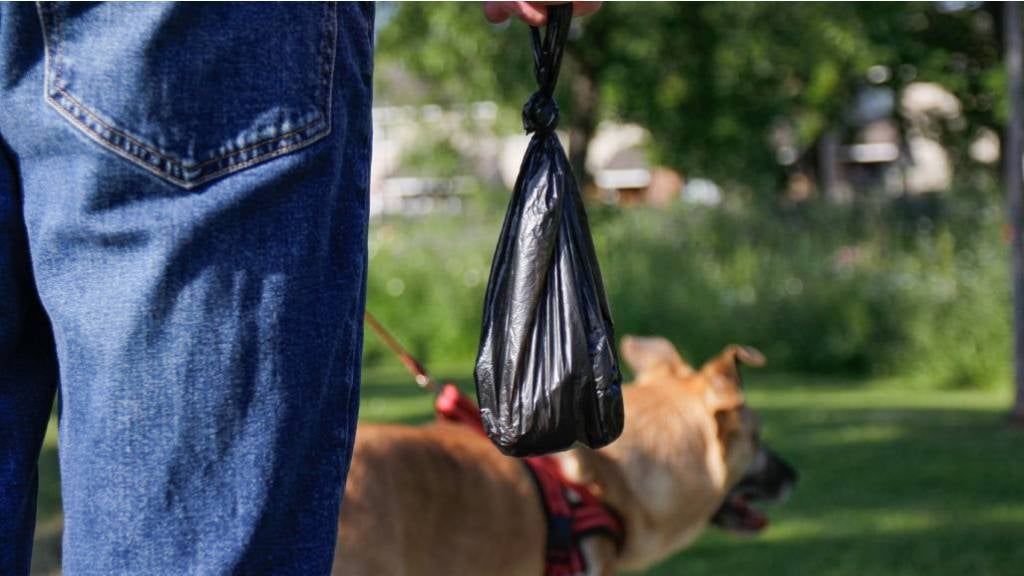How to tell if your dog is constipated

Any dog owner will tell you they didn't expect to spend so much time thinking about their dog's poop. While it may not be the most glamorous topic, poop is a big part of pet ownership. From picking it up on walks to keeping tabs on your dog's bathroom habits, poop plays a significant role in your dog's health.
Can dogs get constipated?
Just like humans, dogs can suffer from constipation. This means they have difficulty passing stools or are producing hard, dry stools. Dog constipation can range from an uncomfortable inconvenience to a serious medical issue. Our expert vet, Dr Rosalind Holland (BVSc, MVM, MANZCVS), is here to help us unpack the signs, symptoms, and solutions for dog constipation.
Constipation is caused by the over-absorption of water and electrolytes from faecal matter by the colon – often due to slowed digestion. Common culprits include ingestion of new food or those difficult to digest.
Dogs of any age, breed, or sex can experience constipation. Dr Holland states, "There are many possible causes for constipation in dogs; however, known risk factors include feeding bones, obesity, and lack of exercise." Knowing these factors can help prevent dog constipation before it becomes a problem.
How does a dog act when constipated?
Constipation is uncomfortable! Naturally, your dog may act differently than usual. Recognising the signs of constipation in your dog is crucial for timely intervention.
How to recognise the signs
- Straining: One of the most common signs of constipation is straining. If your dog is trying to poop, but nothing is coming out.
- Frequent attempts: Your dog might make several attempts to defecate without success. This can be uncomfortable and frustrating for them, so they may appear restless or anxious.
- Hard, dry stools: If your dog does manage to pass stools, they may be hard and dry, making it difficult and painful for them to defecate.
- Lack of poop: A dog's diet is more predictable than ours, and so are their bowel movements. Healthy dogs will be regular, often pooping daily. If your dog hasn't pooped in two or three days, this could indicate constipation.
In addition to straining, dog constipation can cause more general signs such as lethargy, loss of appetite, and even vomiting, Dr Holland notes. On closer inspection, your dog's poop may also contain mucus or blood caused by damage or irritation from hard faeces.
How can I relieve my dog's constipation?
Once you've identified that your dog is constipated, it's time to take action to get things moving again and help them have better bathroom breaks.
Much of constipation relief comes from daily habits and care rather than a one-off fix.
Effective remedies and relief
- Hydration: Make sure your dog has access to fresh water at all times. Dehydration can worsen dog constipation, leading to dry, hard stools. Opt to feed your dog wet foods like dog rolls or canned food, which have a higher moisture content than biscuits or kibble.
- Dietary adjustments: Increasing the fibre in your dog's diet can help stimulate bowel movements. Dr Holland recommends, "Supplementing fibre in the diet can help decrease constipation in dogs through stimulating colonic motility." In this instance, colonic motility regulates the frequency of defecation and consistency of stools.
- Exercise: Regular physical activity helps promote healthy digestion. Take your dog for walks, play fetch, or engage in other activities that get them moving.
When things are well and truly blocked up, a more "hands-on" approach may be needed, at which point you should see a veterinarian. A vet may manually remove the stool, use an enema, or prescribe medication to help your pet. They can also advise you on dietary changes going forward.
How can I stimulate my dog to poop?
If your dog is struggling to poop, there are a few techniques you can try to stimulate bowel movements.
- Massage: Gently massaging your dog's abdomen in a circular motion can help relieve constipation. This helps stimulate the muscles of the digestive tract and encourages movement.
- Warm water soak: Soaking your dog's backside in warm water for 10-15 minutes can also help relax the muscles as well as the stool to aid in passing the poop that is ready to come out.
- Fibre boosters: High-fibre treats, such as figs or cooked pumpkin/kūmera, can help add bulk to your dog's stool and make it easier to pass.
- Vet-approved medications: Sometimes, your vet may recommend a mild laxative or stool softener designed specifically for dogs. Always consult with your veterinarian before administering any medication.
Tips for promoting digestive health in dogs
Preventing constipation is all about maintaining a healthy lifestyle for your dog.
Feed your dog a complete and balanced diet that meets their nutritional needs. Avoid sudden changes in their diet, and limit treats and human food. "In general, it is always best to feed a complete and balanced diet to your dog and make sure they have access to fresh palatable water at all times," Dr Holland advises.
Ensure your dog gets regular exercise to keep their body active and their digestive system functioning correctly. Regular walks and playtime are essential.
Regular veterinary check-ups can help catch any potential health issues that may cause dog constipation. Your vet can provide personalised advice on preventing constipation based on your dog's needs.
Comfort in knowing you’re protected
By incorporating these tips into your routine and keeping an eye on any changes in your dog’s bathroom habits, you can help prevent constipation and keep your dog happy, healthy, and regular.
For further protection for your dog, consider SPCA Pet Insurance. Get a quote online today and explore cover for you and your pet.
18 Oct 2024
All information is general and not intended as a substitute for professional advice.
